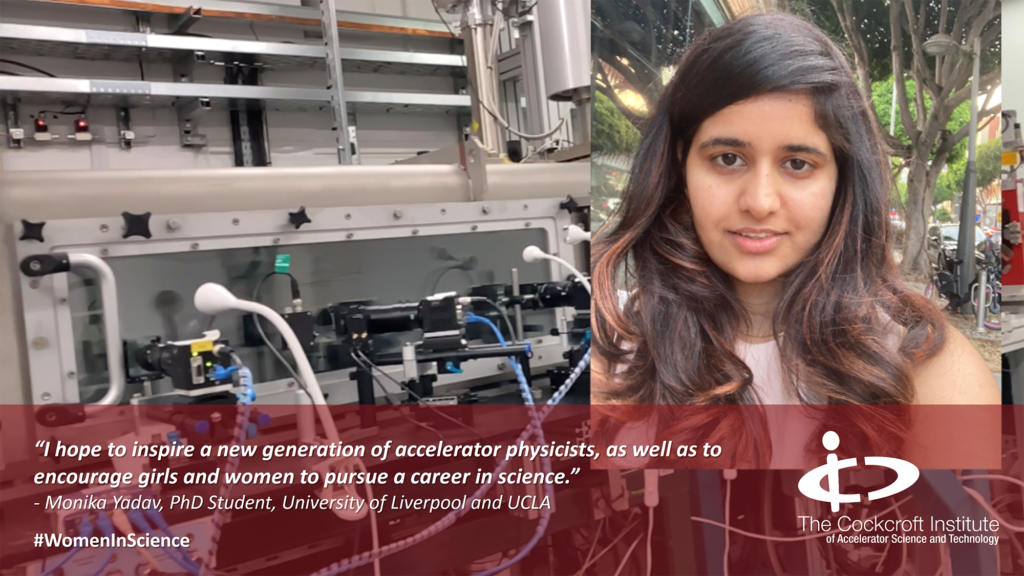
I come from a society (in India) where a girl’s education is not given importance. Over time, people are becoming aware of gender equality and rights. I feel blessed by the fact that my parents always encouraged me to be an independent woman (which is not common in India). For me, pursuing physics didn’t feel like an odd choice because both my parents were lecturers of Physics and Hindi (my National language). My career has allowed me to work in different countries at the world’s top universities and with the best groups in accelerator physics. I have had so many great opportunities for personal growth and development, and choosing a path in physics has given me so much confidence. My supervisors at UoL and UCLA are the key to my growing confidence in accelerator physics. During my time in research, I have come to realize that doing science means contributing a little bit to your field, and I have developed the important skill of communicating my work efficiently. Doing work in research requires open, balanced communication as well as a supportive community, and I am glad to have friends and colleagues who believe in equality and who support and encourage more women to pursue science.
I joined the University of Liverpool in 2018 as a Ph.D. student in Accelerator Physics. I finished my first year at University of Liverpool, then moved to the United States for my 2nd and 3rd year of Ph.D. Changing countries gave me a new level of experience of cultural difference, education system, etc. After moving back to the UK for my final year of PhD, I applied for an internship at D-Beam at CI. Working with a company gave me a completely different view of the field and helped me to better understand academia and industry. As we all know, life is not as it used to be because of COVID. I try to organize myself and work during working hours (9 AM – 6 PM), but there are still days when I start my day in the afternoon and work until late evening. To pursue a PhD in Europe or USA, one must have a bachelor’s degree. It’s always good to have prerequisite knowledge of the field. I am working on various projects as my work is mostly in collaboration with UCLA, SLAC and AWA.
“I hope to inspire a new generation of accelerator physicists, as well as to encourage girls and women to pursue a career in Science.”
Monika Yadav
My research project is “Numerical studies for betatron radiation from underdense plasmas.” I am working on the Trojan Horse experiment at FACET (SLAC). The upcoming E-310 experiment at FACET-II will be the next step demonstrating creation of high brightness beams. I developed four models that examine the betatron radiation: a particle tracking code which computes radiation from Liénard–Wiechert potentials; a Quasi-Static Particle in cell code which computes radiation from Liénard–Wiechert potentials; a full PIC EPOCH code which computed radiation with a Monte-Carlo QED method; and a full PIC code OSIRIS which computes radiation from Liénard–Wiechert potentials The projects I am currently involved in are Betatron radiation Models using Liénard–Wiechert potentials, Flat beam ion motion and plasma lensing, and Reconstruction of beam parameters using Machine learning.
Currently, I am most excited about doing experiments at FACET-II SLAC. Because of COVID, everything has shifted for almost 2 and a half years, so I am looking forward to learning more about the experimental part of my research project.
The best part of my job is that I enjoy doing research exploring new ideas.
I hope to inspire a new generation of accelerator physicists, as well as to encourage girls and women to pursue a career in science. Even in the US, where girls are not overtly discouraged from pursuing science, the number of women in fields such as physics is still small. I would like to say, “things are getting better,” as the years go by. Equal opportunities in any field should go without saying, no matter the context. Over the past decades, the global community has made a lot of effort toward inspiring and engaging women and girls in science, and I would encourage the universities and companies to sponsor more scholarships for women in science.
